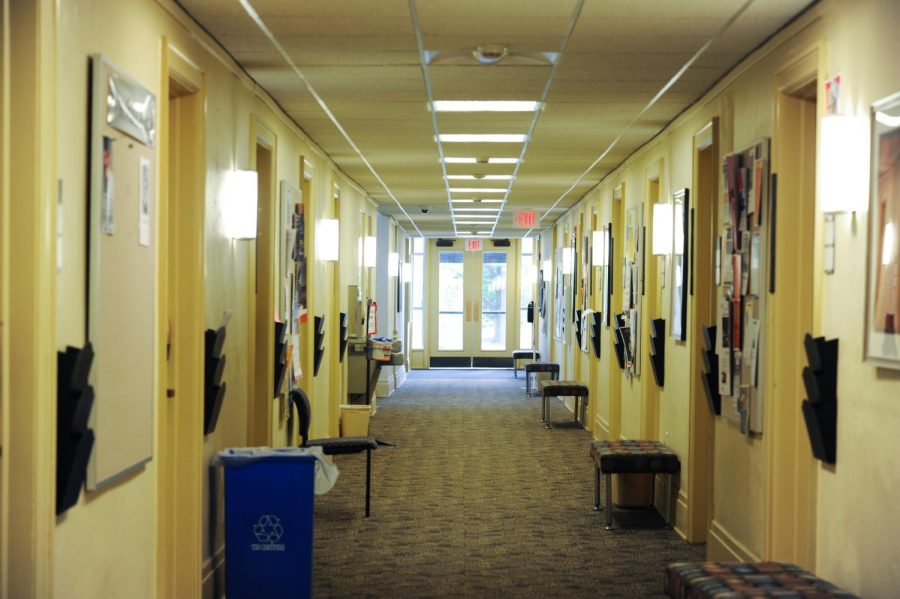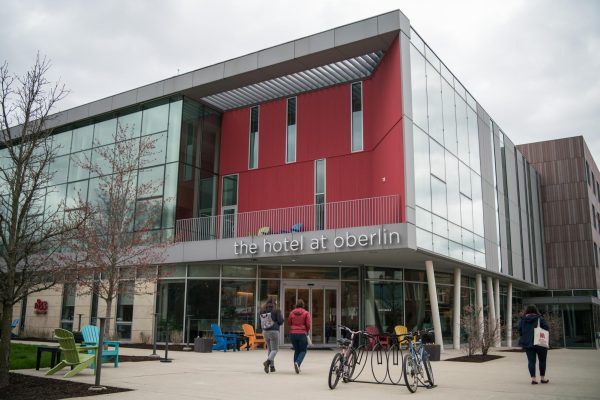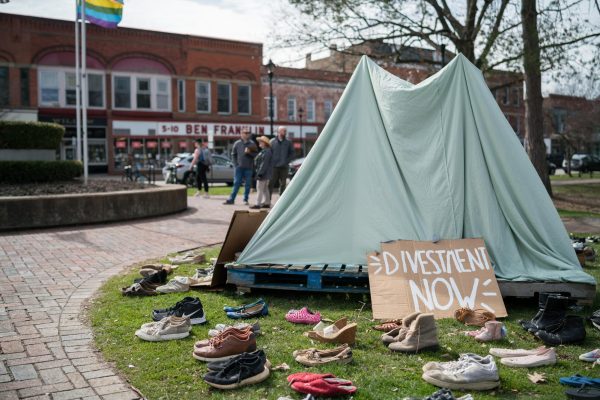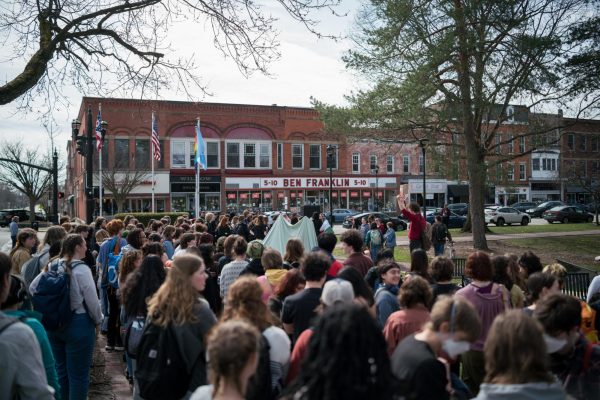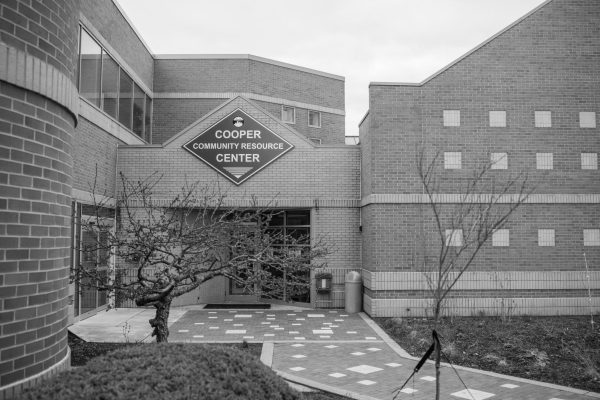Board Committee Proposes Revisions to College Bylaws, Faculty Concerned
The Board will vote on proposed amendments to the College bylaws Oct. 6.
Editor’s note: Since the publication of this article, the Board has voted to amend Article I of the bylaws to read as follows,
“The Board of Trustees has ultimate responsibility for the operation of the College and the preservation of its wellbeing in all respects and in compliance with the Charter of Oberlin College and its accrediting body. The President and the executive leaders, as provided for in these bylaws or as designated by the President, have the authority to implement the decisions of the Board of Trustees and to operate the College successfully within the parameters set by the Board of Trustees and consistent with applicable laws and accreditation standards. The Faculty is responsible for oversight of the curriculum, educational standards related to the quality of instruction and student performance, faculty status, research, standards regarding the quality of instructional personnel, and assessment of student learning and, and those aspects of student life that relate to students’ academic experience. This framework of shared governance, therefore, results in different delegated authority. In keeping with the tradition of Oberlin College, this delegated authority should not discourage consultation with the faculty on matters outside the authority specifically delegated to the faculty, especially in matters of long term strategic importance. Nothing in these Bylaws should be interpreted as a waiver by the Board of Trustees to exercise its authority to supplement, modify, or terminate any delegation of authority set forth in these Bylaws.”
The Board of Trustees will be voting on revisions to Oberlin College’s bylaws, as proposed by the Nominations & Governance Committee, during its next meeting Oct. 6 and 7. The College’s current bylaws outline the terms of governance over the institution, wherein the board has ultimate authority to oversee operations of the College and may delegate responsibilities to various other governing bodies within the institution.
President Carmen Twillie Ambar announced this intent to amend the bylaws in a General Faculty meeting Wednesday, Sept. 21. N&G sent a document to faculty further explaining these changes that evening, and faculty have since raised concerns over changes to faculty governance structures.
“As the current bylaws state, the board is the governing body of the College and retains all the powers appropriate to that status,” Vice Chair of the Board Lillie Edwards, OC ’75, told the Review. “The revision mirrors that same statement with greater specificity that not only does the board hold that power, but it also delegates authority both to the president, as the head of the administration, and to the faculty.”
The proposed amendment addresses six sections of the existing bylaws: overarching authority of the board, the role of the president, the roles of general and divisional faculty bodies, the process for the appointment of deans; the structure of committees under the board; and the discretionary appointment of the provost position. The first two proposals concern articles one and five of the existing bylaws, regarding the board and the president respectively. These proposals are meant to reaffirm the authority of the board and the president, the scope of their responsibilities, and the fact that the board delegates authority to all other governing bodies within the institution.
The third proposal updates the faculty governance systems and specifies their jurisdiction over only academic matters and those elements of student life that relate to curriculum — a shift from the previously broader mandate of generally managing internal affairs in accordance with the bylaws. The fourth proposal suggests a change to the process of appointing deans, specifically in the composition and selection of search committee members. The fifth proposal concerns the internal structure of the board’s committees, namely combining the Student Affairs and Academic Affairs Committees into a single Student and Faculty Success Committee, in addition to the creation of a Tenure and Promotion Committee. Lastly, the sixth proposal contextualizes the role of the provost in the event the board decides to appoint someone to that position.
“The conversation about refining the bylaws has been going on for a very long time,” Edwards said. “When I came onto the board in 2014 and began working with faculty and the administration on strategic planning, there was a recurring refrain regarding the need to revise the bylaws. The current bylaws align neither with how we operate nor with the structures and demands of higher education in the 21st century. … The current bylaws do not reflect the ways the external world views institutional responsibility. They are messy and misaligned. The bylaws revision provides clarity and alignment.”
Edwards added that the revised bylaws would better reflect the manner in which the College does business. According to Trustee Chuck Birenbaum, OC ’79, these changes will help protect the College from a variety of liabilities.
“The board recognized our claims history was a lot greater than it should be for an institution of Oberlin’s size,” Birenbaum said. “The number of lawsuits, employment cases, Title IX claims, personal injury cases, the Gibson’s case, which we can call a torts case — all these claims demonstrated that Oberlin needed to take a hard look at itself in some ways that it hasn’t before. One of the things that [Oberlin] did was it sought professional advice on risk management. A firm came in and performed a whole process on risk management, and one of the areas that they pointed to for risk at Oberlin was ambiguity and the lack of clarity in the bylaws on governance and who should make decisions about what. And in the event in a shared governance situation there’s an impasse, how was that resolved?”
N&G met with members of the General Faculty Council, elected representatives of the General Faculty, to deliberate on these proposals over the course of eight meetings between Feb. 28 and May 23. The revised bylaws would authorize faculty to make decisions exclusively over academic matters, while simultaneously shifting that responsibility from General Faculty to divisional faculty bodies.
“The divisional faculty bodies, subject to the guidance and approval of the Board of Trustees and consistent with the Bylaws, are responsible for the internal affairs of the College in matters pertaining to educational policy, curriculum, methods of instruction, degree requirements, those aspects of student life that relate to students’ academic experience, and the evaluation of the faculty for appointment, tenure and promotion,” the proposed revision reads.
The bylaws currently authorize the General Faculty to propose, deliberate, and vote on matters related to the general welfare of the institution, including regulations pertaining to student organizations and conduct across divisions. The president then reports especially important changes to the board for their consideration. For example, the General Faculty has previously voted to approve decisions like a campus-wide tobacco ban in 2014 and the One Oberlin Report in 2018.
Nathan A. Greenberg Professor of Classics Kirk Ormand raised concerns that the new bylaws would contradict the Finney Compact — an agreement between Charles Grandison Finney and the Oberlin Collegiate Institute dating back to 1835. The compact was introduced by Finney as a prerequisite to his acceptance of the College’s offer to join as a professor of Theology. Clause three of the agreement stipulates that the trustees should give internal control of the institution to faculty, including discretion over admitting students irrespective of color.
“One of the things that Oberlin has been known for from the very beginning of its existence as a college is a strong system of faculty governance,” Ormand said. “Which is to say, it has been the understanding of the board, and the administration, and the faculty at Oberlin literally since 1835, that the faculty run the College. The College is not run by the Board of Trustees. The Board of Trustees manages our money. They are, of course, ultimately responsible for what the College does, and therefore they have the right to prevent us from making large-scale changes to the way that the College is run, that sort of thing. … But controlling the budget is not the same thing as initiating and determining the strategic direction of the College, the operational direction of the College.”
According to N&G, the existing bylaws are unclear on the extent of faculty authority over operational management, and these proposed revisions would clarify that the faculty do not have voting or direct decision-making authority over such topics. However, Birenbaum emphasized that the board still expects faculty to offer their opinions and be involved in the long-term strategic deliberations of the College.
“We are not by this draft of the bylaws suggesting [faculty] should limit their concerns,” Birenbaum said. “What we’re doing is clarifying the voting authority of the board — to the president, to the faculty — about who has authority to decide what. But as to how those decisions are made and input is gathered, and what sensibilities are important and what advice comes to the board on what to do, there’s no limitation. … I don’t think there’s going to be a material change in that way. I think we’re going to continue to solicit opinions on the involvement of the faculty, both in their organizational structure [and] individually, like how they sit on committees with board members — like the Investment Committee.”
Edwards and Birenbaum briefed faculty members on these proposals this past Wednesday afternoon. According to Birenbaum, they received several comments on the proposals from faculty members during the briefing. This feedback will be presented to the board during their Oct. 6 meeting before the final vote takes place that weekend.


